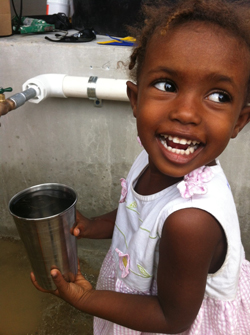1-2 of 2 results
-
Project Haiti
PI Marc Compere
The goals of Project Haiti are to provide Haitians with clean drinking water, to expose our college students to another culture, and to give them a hands-on experience using their engineering skills to directly help people.

Many Haitians living in the tent cities after the earthquake deal with chronic intestinal sickness from contaminated water. Our solar water purifier is designed to provide clean drinking water for 500 adults per day.The Summer 2014 purifier will be installed at the Dayspring Missions orphanage in Croix des Bouquets area, a suburb east of Port-Au-Prince, Haiti. It will provide up to 6000 gallons of water a day with the water being used by the orphans, distributed to three local church communities, as well as being sold to the community to generate income and filter replacement costs.
This project is an ideal intersection of humanitarian aid and engineering. Our students designed and built Embry-Riddle's solar powered water purifier for delivery to a Haitian tent camp. They learned how to use solar panels, batteries, pumps, and filters to construct a purifier that runs entirely from the sun. Now that it is completed, our students have become better engineers and they have learned a global perspective and the satisfaction of helping people in a developing country.
More on Project Haiti
Past Efforts
Summer 2010
In Summer 2010 Embry-Riddle students delivered a 1 gallon-per-minute (gpm) water purifier powered entirely from the sun. The 2010 trip report presentation is available here. It was a valuable success for over 150 college student volunteers who traveled to Haiti that summer to help the disaster relief effort. The Nehemiah Vision Ministries camp upgraded to a 10gpm unit for greater capacity.Summer 2011
In Summer 2011, our team of students designed and installed a 4gpm unit powered entirely from the sun. We installed it at the Anne Clemande Children's Foundation in Chambellan, Haiti. They operate a children's home and school with approximately 600 children and staff. They had no access to clean drinking water. The 2011 trip report is downloadable here.Summer 2012
In Summer 2012, our team of Embry-Riddle students delivered a community water system providing 14gpm of clean, safe water to an Internally Displaced People (IDP) camp named Onaville The purifier is in daily operation delivering roughly 15,000 gallons per day. Onaville was the largest tent city in Haiti during post-earthquake Haiti. This is our most successful trip from a partnership standpoint, a purifier standpoint, and also an academic standpoint. Students received credit during a summer course titled ME595 Practicum in Water Purification. The 2012 trip report is here.Summer 2013
The Summer 2013 unit was installed in Michaud, Haiti, at the Ryan Epps Home for Children. Michaud is a suburb of Port-Au-Prince. This is a 14gpm unit powered entirely by the sun which means nearly zero recurring cost to operate the unit. This is ideal for starting a sustainable micro-business. This system combined with the micro-business provides clean, safe drinking water and also create jobs, generate recurring income, and improve community health. The 2013 trip report is available for download here.Academic Integration
- Our 2012 EPA P3 Entry was a Portable Solar Water Purification Backpack for Disaster Releief. It won the $90k EPA Phase II award, the US Army's NetZero Water Award, and the Student's Choice Award at the 2012 National Sustainable Design Expo
- Dr. Compere teaches two water courses:
- ME595J, Practicum in Water Purification is a lab based, hands-on course that provides students with practical experience in testing for water-borne pathogens, water purification methods, and solar power systems
- HON350, Emerging Trends in Global Water Supply and Demand is a humanities survey course raising awareness of water as the new high-value commodity. This course highlights the major issues in the water-energy nexus, water-food nexus, and water-climate nexus.
- An American Society of Engineering Education (ASEE) SouthEast Regional conference paper on the 2012 unit and trip is available here.
Contact
- Graduate student team leader: Mr. Yung Wong, yung.lun.wong@gmail.com
- Undergraduate student team leader: Mr. Kyle Fennesy, fennesyk@gmail.com
- Faculty Advisors: Dr. Marc Compere at compere@gmail.com or Dr. Yan Tang, yan.tang@erau.edu
Donate
Gifts at any level make a direct impact: Donate to Project Haiti.
Categories: Undergraduate
-
Magnetically-Driven Ventricular Assist Device
PI Eduardo Divo
CO-I Christopher Adams
The proposed project brings together multi-scale computational fluid dynamics (CFD) analysis and mock circulatory loop (MCL) benchtop experiments to analyze the hemodynamics of a proposed Magnetically-Driven Ventricular Assist Device (MVAD).
The multi-scale CFD model combines 0D RLC (Resistance-Inductance-Compliance) chambers to simulate the effects of arterial, capillary, and venous beds coupled with a 3DCFD model of the main arterial system where the MVAD will reside. In addition, a benchtop MCL will be calibrated using vascular resistance elements and compliance chambers to validate the multi-scale CFD predictions. The MCL will be driven by a Harvard Apparatus pulsatile pump that simulates the ventricular output and the test-selection centerpiece will be the MVAD prototype. The MCL fluid will be water loaded with magnetically-charged particles (such as ferrous particles embedded in silicon spheres). A dimensional analysis will be carried out by matching fluid dynamics parameters (such as Reynolds and Womersley numbers) between the Multi-Scale CFD and the benchtop MCL. This will allow the numerical and benchtop analyses to be analogous even though they operate on different fluids (blood and water). The results of this study will serve as validation of the hypothesis that a magnetically-driven pump with no moving parts can serve to assist in the cardiovascular circulation and thus reduce the risks associated with mechanical assist devices such as thrombus formation and stagnation.
Categories: Undergraduate
1-2 of 2 results
